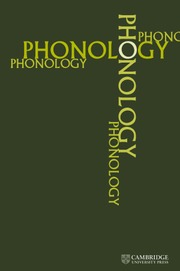Crossref Citations
This article has been cited by the following publications. This list is generated based on data provided by
Crossref.
Trenkic, Danijela
2007.
Variability in second language article production: beyond the representational deficit vs. processing constraints debate.
Second Language Research,
Vol. 23,
Issue. 3,
p.
289.
Cardoso, Walcir
2007.
The variable development of English word-final stops by Brazilian Portuguese speakers: A stochastic optimality theoretic account.
Language Variation and Change,
Vol. 19,
Issue. 3,
p.
219.
Zec, Draga
2009.
Stephen R. Anderson,Aspects of the theory of clitics(= Oxford Studies in Theoretical Linguistics 11). Oxford: Oxford . i + 317pp. ISBN-10 0-19-927991-8, ISBN-13 978-0-19-927991-3 (paperback), ISBN-10 0-19-927990-X, ISBN-13 978-0-19-927990-6 (hardback)..
Word Structure,
Vol. 2,
Issue. 1,
p.
139.
SCHIERING, RENÉ
BICKEL, BALTHASAR
and
HILDEBRANDT, KRISTINE A.
2010.
The prosodic word is not universal, but emergent.
Journal of Linguistics,
Vol. 46,
Issue. 3,
p.
657.
Diesing, Molly
and
Zec, Draga
2011.
Experiments at the Interfaces.
Vol. 37,
Issue. ,
p.
1.
Cardoso, Walcir
2011.
The development of coda perception in second language phonology: A variationist perspective.
Second Language Research,
Vol. 27,
Issue. 4,
p.
433.
Round, Erich R.
2011.
Function word erosion which is not a frequency effect: On exemplars and prosodic paradigm levelling.
Lingua,
Vol. 121,
Issue. 2,
p.
287.
오영일
2012.
Prosodic Structure and Phrasing of Function Words in English.
English Language and Linguistics,
Vol. 18,
Issue. 3,
p.
253.
MEINSCHAEFER, JUDITH
BONIFER, SVEN
and
FRISCH, CHRISTINE
2015.
Variable and invariable liaison in a corpus of spoken French.
Journal of French Language Studies,
Vol. 25,
Issue. 3,
p.
367.
Bennett, Ryan
Elfner, Emily
and
McCloskey, James
2016.
Lightest to the Right: An Apparently Anomalous Displacement in Irish.
Linguistic Inquiry,
Vol. 47,
Issue. 2,
p.
169.
Bennett, Ryan
Harizanov, Boris
and
Henderson, Robert
2018.
Prosodic Smothering in Macedonian and Kaqchikel.
Linguistic Inquiry,
Vol. 49,
Issue. 2,
p.
195.
Talić, Aida
2018.
Spelling out enclitics and giving their tone a voice: Cyclic clitic incorporation in BCS and breaking the cycle.
The Linguistic Review,
Vol. 0,
Issue. 0,
Bennett, Ryan
2018.
Recursive prosodic words in Kaqchikel (Mayan).
Glossa: a journal of general linguistics,
Vol. 3,
Issue. 1,
GUZZO, NATÁLIA BRAMBATTI
2018.
The prosodic representation of composite structures in Brazilian Portuguese.
Journal of Linguistics,
Vol. 54,
Issue. 4,
p.
683.
Bellik, Jennifer
and
Kalivoda, Nick
2019.
Automated tableau generation using SPOT (Syntax Prosody in Optimality Theory).
Linguistics Vanguard,
Vol. 5,
Issue. 1,
Hsu, Brian
2019.
Exceptional prosodification effects revisited in Gradient Harmonic Grammar.
Phonology,
Vol. 36,
Issue. 2,
p.
225.
Goad, Heather
and
White, Lydia
2019.
Prosodic effects on L2 grammars.
Linguistic Approaches to Bilingualism,
Vol. 9,
Issue. 6,
p.
769.
Louriz, Nabila
2019.
Studies on Arabic Dialectology and Sociolinguistics.
Talić, Aida
2019.
Upward P-cliticization, accent shift, and extraction out of PP.
Natural Language & Linguistic Theory,
Vol. 37,
Issue. 3,
p.
1103.
Tyler, Matthew
2019.
Simplifying M<small>ATCH</small> W<small>ORD</small>: Evidence from English functional categories.
Glossa: a journal of general linguistics,
Vol. 4,
Issue. 1,


